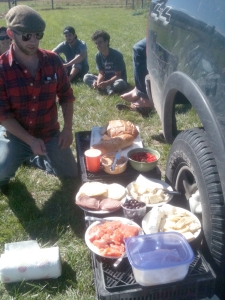Early last month a story broke in California about a small winery that had been subject to hefty fines levied by state labor authorities for the use of willing volunteers, and then fined again during their process to try and mitigate the unintended wrong. This has prompted conversations across the industry and across the country as wineries and their advocates look to their own state laws to see what kind of risks they might be exposed to. Hans Walter-Peterson in the Finger Lakes has mentioned the situation in recent issues of the Finger Lakes Vineyard Update newsletter, and we are recently in receipt of his clarifications as to how this may impact New York producers.
Further Clarification on Use of “Volunteer” Labor at NY Businesses
In the two most recent issues of the Vineyard Update (newsletters), I mentioned an article about a winery in California had been assessed a hefty fine ($115,000) for employing volunteer labor at their business. After seeing this article, we’ve done some digging to find out if using volunteers at businesses in New York is also prohibited. We passed the question along to representatives of NY Farm Bureau, and just heard back from them.
In a nutshell, according to NY State labor laws, for-profit businesses cannot have anybody working for them as volunteers. If somebody is working for your business in any way (e.g., picking grapes, pouring wines in the tasting room, scrubbing floors in the cellar), they are considered an employee and need to be paid according to the state’s minimum wage laws. There are no exemptions to this prohibition for agriculture-related businesses.
In their response to us about this issue, NY Farm Bureau did mention that “NYFB has tried in past years to establish a ‘training/volunteer/intern’ type of program with the Department of Labor & legislature. The closest thus far being an internship program. However, with the structure of the labor laws it proves to be a bit more complicated than initially anticipated. We will continue to push this issue though and attempt to gain some traction with a workable internship program.”
Of course, Cornell Cooperative Extension and NYFB are not legal advisors, so please don’t consider this official legal advice, but we wanted to get this information out to everyone. Given that, any growers and wineries who are considering using volunteers to help out during harvest, or any time during the year, should think twice before doing so.
-Hans Walter-Peterson [ Finger Lake Grape Program / Cornell Cooperative Extension ]
Merriam-Webster may define volunteerism as “the act or practice of doing volunteer work in community service”, but unfortunately it would seem that the wine community is one where such service is not allowed. Actually it’s not just the wine industry, because the federal Fair Labor Standards Act which establishes rules for minimum wage, overtime pay and the like also prohibits volunteer support of For-Profit businesses, while preserving exemptions for non-profit, public sector, and religious institutions. Much of the reasoning supporting the prohibition calls upon arguments about required minimum compensation for work services rendered, the issue of work performed without workman’s compensation insurance coverage, and the unfair competition gained by a winery that does not need to pay for the completion of tasks that are undertaken by volunteers.
Still, the questions are out there…and even as more views come to light, and others weigh in on the impacts, it would seem that there is still may be a lot to talk about. It’s Drink Local Wine Week, and for a number of folks who support their local producers, it’s not just about the commercial act of purchase and consumption, it’s about hands-on participation in a locally oriented agricultural process that has been part of human history for close to ten thousand years, more or less.
Healthy competition is not based only on wine sales but by the quality and enthusiasm of the community that a winery builds around itself.
If customers want to volunteer is that not the sign of a successful organization and locally based asset?
Should the prohibition be a blanket policy for all for-profit business or should there be exemptions for small scale agricultural pursuits? There are currently a number of liberal agricultural policies in the labor code that allow for extensive use of child farm labor with few protections for the workers.
Do folks have the right to take personal responsibility and with informed consent, freely choose to participate in volunteer work at wineries for their own purposes and edification, without expectation of financial remuneration?
Is this an issue that should be left to the vineyards and wineries to sort out with the labor boards, or is this something that individual supporters of those wineries should be taking up with their legislators?
We think that this may just be the beginning of a much larger discussion, and we’d certainly like to hear what our readers and local wine lovers have to say.


